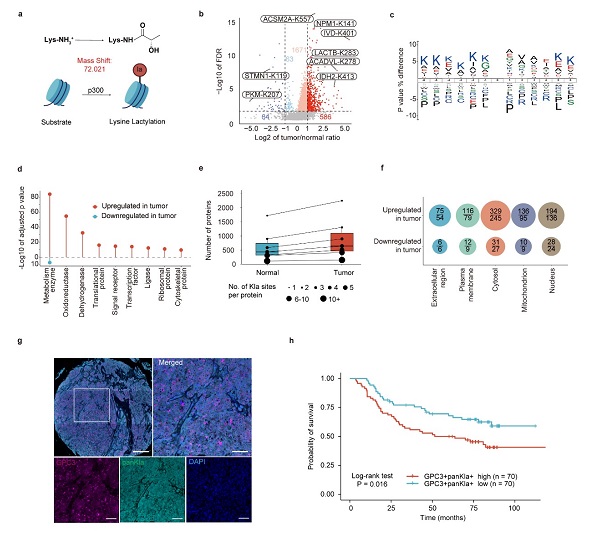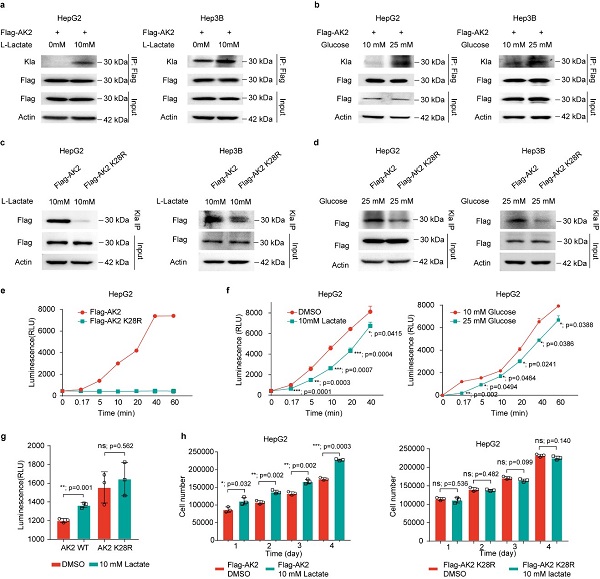Mapping Lactylome in Hepatocellular Carcinoma Revealed New Mechanisms of Metabolic Adaptation
Lactate, a major product of glycolysis in mammals, is significantly increased in pathological states such as tumors, sepsis and autoimmune diseases, which is known as the Warburg effect. Despite being an important metabolic product that promotes tumor progression in cancer cells, lactate has nonmetabolic functions as well. For example, recent studies have found that lactate can drive the formation of histone lysine lactylation (Kla), a novel posttranslational modification (PTM), which in turn plays an essential role in gene transcription regulation and provides new insights into the nonmetabolic functions of lactate.
The liver is one of the key organs of glycolipid metabolism; therefore, a variety of pathologies in the liver are closely associated with metabolic abnormalities. Hepatocellular carcinoma (HCC) has certainly been one leading cause of cancer-related deaths worldwide, and its intracellular accumulation of lactate due to the Warburg effect has become one of its clinical features. However, it is unknown whether high levels of lactate in HCC drive the formation of Kla on proteins, particularly nonhistones, and how Kla affects the development of HCC.
To unravel the contacts between Kla and HCC progression, the team of Prof. FAN Jia and Prof. GAO Qiang from Zhongshan Hospital, Fudan University, in collaboration with the team of Prof. HUANG He from Shanghai Institute of Materia Medica (SIMM), Chinese Academy of Sciences, performed the first lactylome analysis of an HCC cohort and further carried out functional studies on key lactylation sites of substrate proteins to reveal new mechanisms of metabolic adaptation in HCC.
A total of 52 tumor and adjacent liver tissues from hepatitis B virus (HBV)-associated HCC patients were collected for in-depth lactylome and proteome analysis, and 9,275 Kla sites and 9,140 proteins were successfully identified (Figure 1). Notably, 9,256 Kla sites are on nonhistones, suggesting that Kla may be involved in a broader biological function beyond transcriptional regulation on histones. Importantly, Kla preferentially affects enzymes involved in important metabolic pathways, including carbohydrate metabolism, the tricarboxylic acid (TCA) cycle, amino acid metabolism, fatty acid metabolism and nucleotide metabolism. In addition, higher levels of Kla on proteins in these metabolic pathways are strongly associated with aggressive clinical features and driver mutations in HCC.

Figure 1. Characteristics and prognostic significance of protein lysine lactylation in HCC
Moreover, by integrating clinical data and lactylome data, researchers found that higher Kla levels of ATP metabolism-associated adenylate kinase 2 (AK2) in tumor tissue from patients with more aggressive proliferative subtypes were related to poorer prognosis, which may be explained by the upregulation of oncogenic signaling pathways and downregulation of liver-specific metabolism-related pathways and p53 pathways. In addition, patients with higher lactylated AK2 were more likely to develop tumor thrombosis. Furthermore, researchers conducted a series of cellular-level experiments and confirmed that K28 lactylation of AK2 inhibited its kinase activity, leading to intracellular energy disruption and promoting the proliferation, invasion and metastasis of HCC cells (Figure 2). These results suggest that Kla plays a crucial role in regulating cellular metabolism and may promote HCC progression through aberrant metabolism.

Figure 2. AK2-K28la weakens AK2 enzymatic activity and contributes to HCC malignancy
In conclusion, this study provides the first systematic and comprehensive mapping of Kla substrates in HCC tissues, reveals the broad and critical regulatory role of Kla in cellular metabolism, and experimentally validates the ability of Kla to regulate metabolism-related protein functions, providing a new understanding of disease progression and therapeutic interventions in HCC.
Link to the paper: https://www.nature.com/articles/s42255-022-00710-w
CONTACT:
DIAO Wentong
Shanghai Institute of Materia Medica
E-mail: diaowentong@simm.ac.cn




